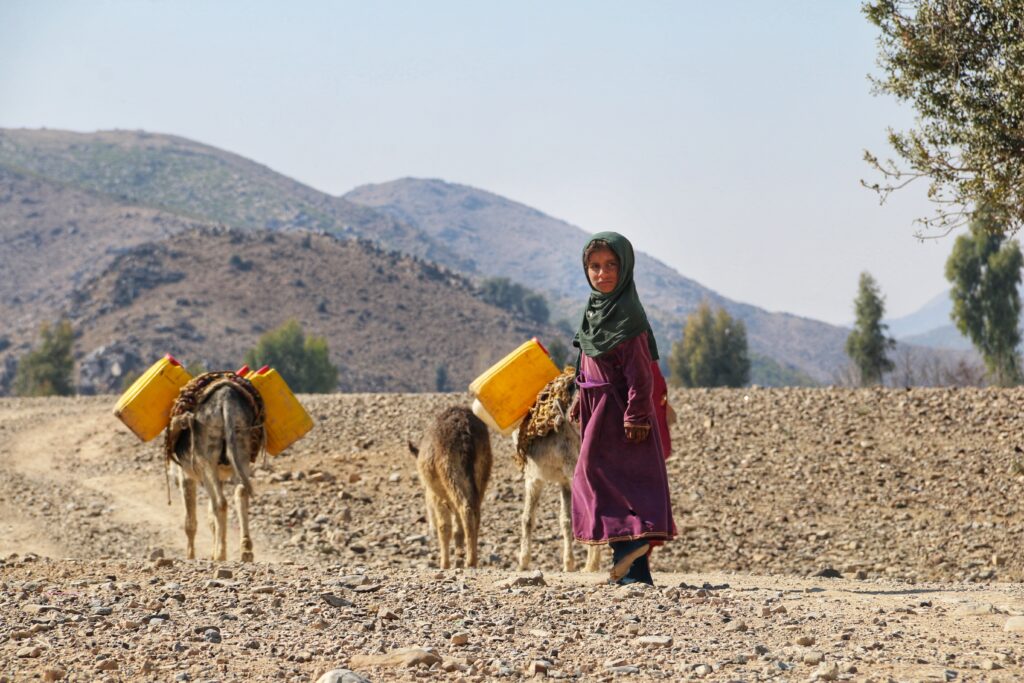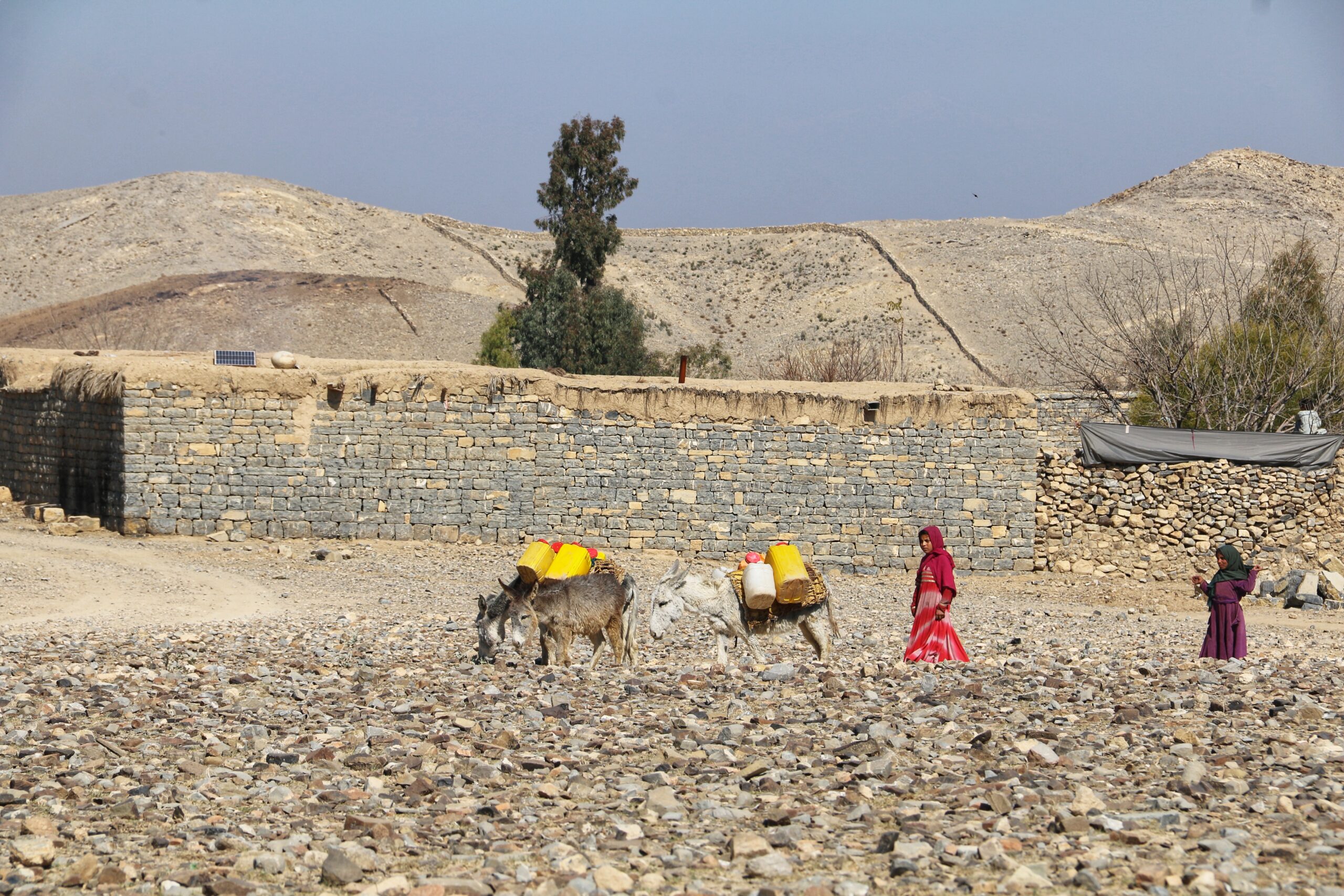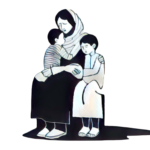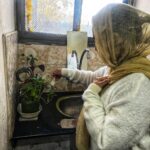In the desolate hills of rural Afghanistan, life revolves around the simplest and most essential of human needs: water. It’s dawn, and the sun casts its first light over a rugged, barren landscape. Two sisters, ages 15 and 14, drape scarves over their heads, tightening them against the chilly morning breeze. Today, like every day, they will begin a journey—one that takes them miles away from home in search of clean water, a task that has come to define their young lives.
With a steady determination far beyond their years, they urge their faithful donkey, a gray, weathered creature burdened with empty yellow jerry cans, across the rocky terrain. This journey, lasting several hours, is not just about water. It is a daily quest for survival—a routine that leaves no room for childhood.
The Daily Reality of Water Insecurity
“We wake up before sunrise,” says the elder sister, her voice carrying the weight of fatigue. “We have to go early, or we will lose time.” In the stark landscape of southern Afghanistan, time is measured not in minutes, but in distances to the nearest water source—a journey that, even under the best of conditions, can take three hours each way. The narrow, twisting path is a familiar one to the sisters, but it remains dangerous. They know they must reach the water before it’s too crowded, and before the water itself runs dry.
As they walk, their sandals kicking up clouds of dust, the only sounds are the braying of their donkey and the crunch of gravel underfoot. They are alone in a wilderness that is as harsh as it is beautiful—a wilderness made harsher by years of drought, neglect, and now, by a new political reality that has plunged the nation deeper into crisis. Since the Taliban returned to power, the sisters’ village, like many others, has been cut off from international aid. Development projects have vanished, promises of new wells have faded, and hope has become a distant memory.
A Childhood Stolen by Necessity
For these girls, fetching water is more than a chore—it’s a sacrifice. Each day spent hauling water is a day lost to the potential of education. “I used to go to school,” says the younger sister, clutching the donkey’s reins, “but there was no time left.” The school is far, and the needs of their family are many. Their parents, grappling with the instability that has swept across Afghanistan, rely on the girls to ensure that the household has enough water to survive.
The elder sister’s face, framed by a tightly drawn headscarf, is set with determination. Yet, when she speaks of her dreams, there is a flicker of vulnerability. “I wanted to be a teacher,” she admits, “but first, we need water. Without it, we can’t do anything.” Their voices carry not just the weight of the water they bear, but the silent resignation of two children forced to shoulder responsibilities that no child should face.
The Dangers Lurking in the Shadows
The path they take to fetch water is not safe. In Taliban-controlled regions, the sisters face dangers at every turn. There are rumors of violence, of roadblocks, and of girls who have disappeared while performing this same daily ritual. The new regime’s restrictions have only amplified the risks, and the absence of security forces means that there are no protections, only the mercy of the unknown.
Yet, they continue. “We don’t have a choice,” the elder sister says, her voice low and resolved. “If we don’t go, there’s nothing to drink.” Their mother, wracked with worry, waits for their safe return each afternoon, glancing anxiously at the horizon, hoping that this day will end like the last, without incident.
The water they collect—often cloudy, sometimes muddy—is rarely safe. Contaminated wells and polluted streams are all that remain for most villagers in this forgotten corner of the world. Still, it’s the only water they have. The burden of illness is one they are familiar with, having watched neighbors grow sick and frail from the very thing they must drink to survive.
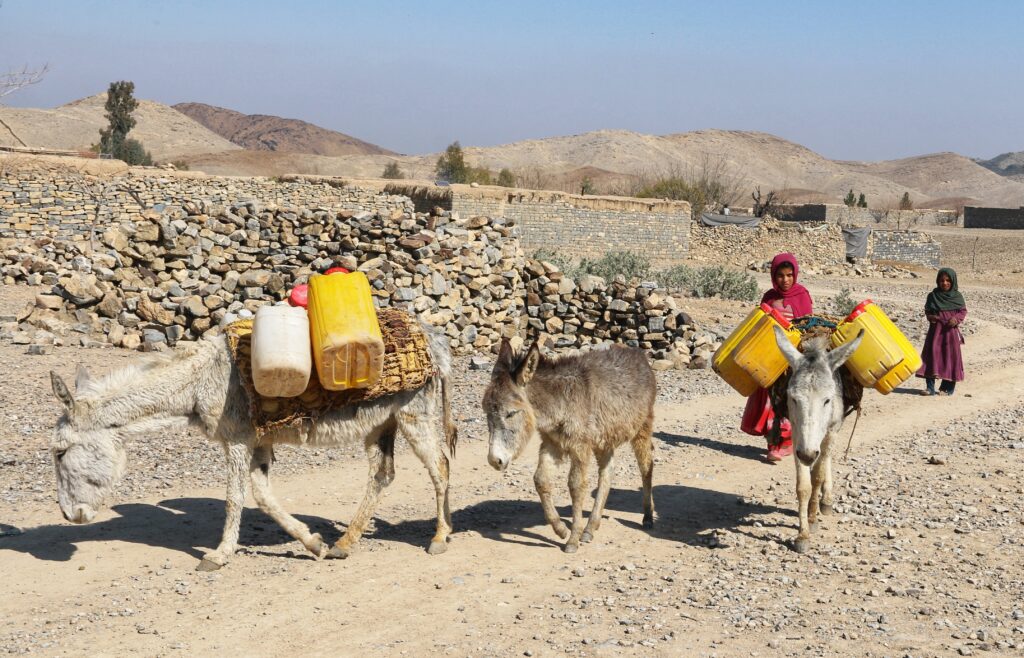
The Costs of Water Scarcity in Afghanistan’s Forgotten Corners
The girls’ story is not unique. Across rural Afghanistan, millions face the same desperate circumstances. Years of conflict have eroded infrastructure, and the international aid that once trickled in has all but vanished. Droughts, worsened by climate change, have shriveled streams and wells, and the relentless march of time has turned fertile lands into deserts. The collapse of the previous government has only deepened the crisis. Water, once accessible through tenuous pipelines and sporadic aid projects, has now become a luxury—one that requires resilience, strength, and sometimes, the sacrifice of safety.
The sisters’ worn faces tell the story of a generation robbed of its future. As they make the long trek home, the heavy containers sloshing with water, their pace slows. The weight digs into their shoulders, leaving indentations on their fragile frames. The journey is harder in the afternoon sun, but there is no room for hesitation. The family must have water to drink, to cook, to wash—tasks that have become back-breaking necessities.
A Cry for Global Awareness
Their daily walk is a stark reminder that water insecurity is not just an inconvenience, but a life-altering struggle. In Afghanistan, it means children sacrificing their education, their health, and sometimes their safety, to meet the most basic of needs. It is a problem that has slipped from the world’s consciousness as political debates dominate headlines and humanitarian crises compete for attention.
Yet, the sisters’ faces linger in the mind. They are young, but their eyes carry the wisdom of survival, the unspoken resilience of children who have been forced to grow up too fast. As they approach their village, the sun beginning to sink behind the hills, their mother rushes to meet them, relief washing over her face. The water they bring is poured carefully into clay jars, precious drops guarded like gold. Tomorrow, they will make the journey again, and the day after that, and the day after that.
What the World Must Do
Afghanistan’s struggle with water scarcity is a call for urgent global attention. Sustainable solutions like rainwater harvesting and the construction of safe wells are not luxuries—they are lifelines.
Dr. Huda Ahmadi, a humanitarian worker focused on water access in Afghanistan, stresses, “Water is the most basic human need, and without it, survival itself is at risk. The international community must step in to provide the support and resources needed to address this crisis, especially in rural areas like Khost, where families are forced to walk for hours to find clean water.”
The story of Afghanistan’s water insecurity is not just about survival—it is about resilience in the face of crisis. “This is not just a fight for water,” says Faizullah Kakar, an Afghan development expert. “It is a fight for dignity, for hope, and for the future of the generations that will inherit this land.”
Afghanistan’s ongoing battle for access to clean water underlines a critical issue: it is not only a matter of necessity, but of human rights. The faces of young children, the sick, and the elderly, who must endure the daily struggle for water, are a reminder of what is at stake. It is the future of a nation, the well-being of its citizens, and the ability to fulfill even the most basic human needs.
